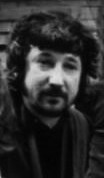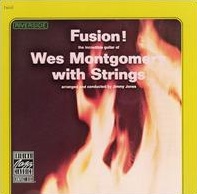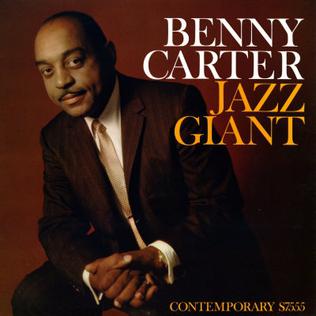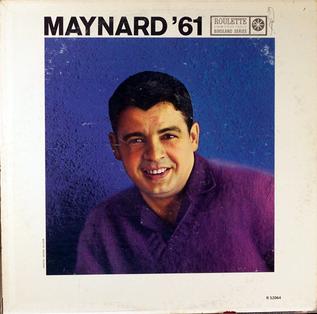
Cecil Percival Taylor was an American pianist and poet.

Horace Ward Martin Tavares Silver was an American jazz pianist, composer, and arranger, particularly in the hard bop style that he helped pioneer in the 1950s.

Ronnie Scott OBE was a British jazz tenor saxophonist and jazz club owner. He co-founded Ronnie Scott's Jazz Club in London's Soho district, one of the world's most popular jazz clubs, in 1959.

Song for My Father is a 1965 album by the Horace Silver Quintet, released on the Blue Note label in 1965. The album was inspired by a trip that Silver had made to Brazil. The cover artwork features a photograph of Silver's father, John Tavares Silver, to whom the title composition was dedicated. "My mother was of Irish and Negro descent, my father of Portuguese origin," Silver recalls in the liner notes: "He was born on the island of Maio, one of the Cape Verde Islands."

Further Definitions is a 1962 jazz album by Benny Carter and his orchestra, rereleased on CD in 1997 coupled with his follow-up album, 1966's Additions to Further Definitions. The earlier album features an all-star octet that includes Coleman Hawkins, with whom Carter had recorded in Paris in 1937, using the same configuration of instruments: four saxophones, piano, guitar, bass, and drums.

Focus is a jazz album recorded in 1961, featuring Stan Getz on tenor saxophone with a string quartet, piano, bass, and drums. The album is a suite which was originally commissioned by Getz from composer and arranger Eddie Sauter. Widely regarded as a high point in both men's careers, Getz later described Focus as his favorite among his own records. The pair would next collaborate on their soundtrack to the 1965 film Mickey One.

Richard Edwin Morrissey was a British jazz musician and composer. He played the tenor saxophone, soprano saxophone and flute.

Conquistador! is a 1968 studio album recorded in 1966 by free jazz pianist Cecil Taylor, released by Blue Note Records.
Frank Wright was an American free jazz musician, known for his frantic style of playing the tenor saxophone. Critics often compare his music to that of Albert Ayler, although Wright "offers his honks and squawks with a phraseology derived from the slower, earthier funk of R&B and gospel music." According to AllMusic biographer Chris Kelsey, Wright "never recorded even a single record under his own name for a major label; he was 'underground' his entire career." In addition to tenor saxophone, Wright also played the soprano saxophone and bass clarinet.

Trane's Blues is a compact disc credited to the jazz musician John Coltrane, released in 1999 on Blue Note Records, catalogue 98240. It comprises recordings from sessions for Blue Note and United Artists Records with Coltrane as a sideman for Paul Chambers, Sonny Clark, Johnny Griffin, and Cecil Taylor. These recordings were issued respectively on their Whims of Chambers, Sonny's Crib, A Blowin' Session, and Hard Driving Jazz albums. Two selections are from Coltrane's own 1957 Blue Train, and "One for Four" had been previously unissued. "Trane's Blues" had been issued on the compilation High Step in 1975, previously known as "John Paul Jones" and named after himself, the bass player Chambers, and the drummer Philly Joe Jones. Like Prestige Records before them, as Coltrane's fame grew long after he had stopped recording for the label, Blue Note used varied recordings, often those where Coltrane had been merely a sideman, and reissued them as a new album with Coltrane's name prominently displayed. In this case, the Big Four conglomerate EMI continued that earlier practice.

Cookin’ is the first of three live albums by Swiss drummer Charly Antolini and UK saxophonist Dick Morrissey containing mainly jazz and pop standards. The album was recorded live in Germany in 1989.

Blue Spring is a 1959 album by jazz trumpeter Kenny Dorham and saxophonist Cannonball Adderley released on the Riverside label, featuring performances by Dorham and Adderley with Dave Amram, Cecil Payne, Cedar Walton, Paul Chambers, and Philly Joe Jones or Jimmy Cobb.

Fusion!: Wes Montgomery with Strings is an album by the American jazz guitarist Wes Montgomery, released in 1963.

Asia Minor is an album by Jamaican-born jazz trumpeter Dizzy Reece featuring performances recorded in 1962 and originally released on the New Jazz label.

Quiet Nights is a studio album by the American jazz trumpeter Miles Davis, and his fourth album collaboration with arranger and conductor Gil Evans, released in 1963 on Columbia Records, catalogue CL 2106 and CS 8906 in stereo. Recorded mostly at Columbia's 30th Street Studios in Manhattan, it is the final album by Davis and Evans.
"Nardis" is a composition by American jazz trumpeter Miles Davis. It was written in 1958, during Davis's modal period, to be played by Cannonball Adderley for the album Portrait of Cannonball. The piece has come to be associated with pianist Bill Evans, who performed and recorded it many times.

Derek Nash is a British jazz saxophonist, band leader, arranger and recording engineer.

Jazz Giant is an album by saxophonist Benny Carter that was recorded in 1957 and 1958 and released by Contemporary Records.

Maynard '61 is an album by jazz trumpeter Maynard Ferguson featuring tracks recorded in late 1960 and early 1961 and originally released on the Roulette label.

















